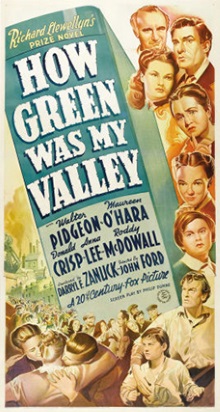
As expected, this film is quite similar to director John Ford’s The Grapes of Wrath made only a year earlier. Both films concern themselves with the lives and times of a single family but while the former is about the travails of a sharecropping family who makes their way westwards during the Great Depression in the United States, How Green Was My Valley depicts the way of life in a Welsh mining village.
Huw Morgan is the youngest son of a large family living in the village of Cwm Rhondda. His father and all of his brothers work in the local coal mine while his mother and his only sister maintain the household. During Huw’s childhood, life in the village is good. The film shows the men merrily singing as they leave work and their happiness as his eldest brother marries a girl from a neighboring valley. During the celebrations, his sister Angharad is attracted to the new preacher Mr. Gruffydd. The good times don’t last however as low coal prices and excess labor lead the mine owner to reduce wages. The men advocate for forming a union and going on strike, but Huw’s father Gwilym who is the representative of the workers disagrees, causing resentment against him. As workers lose their jobs, some of Huw’s brothers move abroad to make their fortunes and Angharad marries the son of the mine owner as Gruffydd refuses to let her live a life of poverty. Huw himself is given the chance to be educated but chooses to work in the colliery with the rest of his family though it is a dirty and dangerous job.
The film has no central plot, being a grouping of many small stories that depict the way of life unique to these small Welsh villages and how they disappear over time. Ford’s sympathy for the socialist cause remains evident in this film but it isn’t as central a focus as it was in The Grapes of Wrath. In fact this film very much embraces the contradictory duality of the town’s prosperity while it lasted. At the same time that Huw reminiscences about the natural beauty and greenery of the valley he grew up in, he acknowledges that their entire economy is based around the coliery and that the expanding mining operations would eventually mar and blacken the landscape. In the same way, the film lavishes praise on the simple joys of the people and their habit of breaking out in song, yet points out that this only lasts while times are good and that when the going gets tough, their insular society gives in to small-mindedness and petty feuds. Any rational person would counsel the young Huw to take advantage of his education and become a lawyer or a doctor in the city, yet he is pulled by his local ties to become a common laborer like everyone else.
Every part of the production including the acting and the cinematography is top notch. It’s impossible to not get swept away by the sense of nostalgia for a time and place that has forever disappeared though of course none of us ever knew it for real. I was especially impressed however to read that the whole thing was filmed not in an actual Welsh village but in a replica built in a California studio lot. Furthermore none of the cast are actually Welsh. I guess if I were actually Welsh I would be capable of spotting the errors and inconsistencies in it just as we are often able to spot numerous problems with American attempts to portray Chinese people and culture. But I think this film makes for a rather good argument that the Hollywood version is good enough for most purposes and that however bastardized it is, it does record a bit of history and culture both for the purposes of promulgation to the masses and for the sake of posterity.
Obviously I admire and enjoyed this film a great deal though I am well aware that it’s seeing a slice of history through rose-tinted glasses and that the reality could never be as simple as Huw’s childhood makes it out to be. This is also remembered as one of my biggest upsets in the history of the Academy Awards as it won the Best Picture award instead of Citizen Kane, now widely regarded as perhaps the greatest film of all time. In my opinion, while Citizen Kane is unquestionably the more innovative film that would go on to influence countless filmmakers, How Green Was My Valley is a fine enough film in its own right that having it win at that time wasn’t an egregious error.
One thought on “How Green Was My Valley (1941)”